- Home
- Michael Byrnes
The Sacred Blood Page 7
The Sacred Blood Read online
Page 7
An instant later, the door leading to the elevator let out a loud clack as
cracks webbed out from a single hole blown through the center of its tempered glass. The round thwacked into the windowpane behind Charlotte’s
head, making her snap into action.
The assistant was just making her way through the metal door, and
Donovan muscled Charlotte through right behind her. He stole a glimpse
of the large gunman, who was throwing his shoulder against the fractured
glass. A third attempt brought the door down in a thousand pieces, the
man stumbling forward into the office.
“Come on! ” Donovan screamed. He ducked into the doorway,
Charlotte at his heels. He yanked the safety door shut just as another round thudded close to the handle. “How do we get out of here?” he
panted.
“Follow her,” Charlotte replied, her tone full of dread. She pointed
to her assistant, who was already halfway down the corridor. Adrenaline was helping her to pretend that she hadn’t just witnessed Evan’s
murder.
12
******
Orlando unclipped the geneticist’s ID badge from a neck strap he’d spotted on her desk and waved it in the air. “Hey! Take this,” he called loudly. On the other side of the glass partition, his partner was trying unsuccessfully to unlock the door through which the three had escaped and was preparing to blast a hole through the lock. The facilities on this floor required higher security access than what was permitted by the badge he’d forcefully “borrowed” from the undersize tech he’d stuffed into a utility closet in the parking garage.
Kwiatkowski—his shirt and lab coat drenched with coffee; the front of his neck blistered and red—raced in to retrieve the key card.
“I’ll handle this,” Orlando said, eyeing the computer monitor. “You go.” He waved toward the metal door. “And put that away,” he ordered, eyeing the man’s Glock.
Tucking the gun into a concealed underarm holster, Kwiatkowski rushed next door, opened the metal door with the first card swipe, and disappeared beyond.
Orlando grinned when he saw a laptop patched into the workstation’s dummy terminal. Shortly after giving up Donovan’s name, the Vatican priest, Father Martin, had since called to inform him of an American geneticist’s involvement in the project too. The cleric couldn’t recall her name, but he’d remembered invoices paid to her Phoenix-based employer, BioMedical Solutions, Inc.
After Donovan had fled his shop, Orlando and Kwiatkowski had scoured Belfast for his motorcycle, with no results. It was while they were ransacking his home that the call came through on Orlando’s cell phone— results from traces run on Donovan’s passport and credit cards. By then, Donovan’s Aer Lingus flight to JFK International had already lifted off Belfast International’s runway.
Though the priest had been one step ahead, they hadn’t been far behind.
Their employer’s private Learjet had swiftly begun closing the gap. While in the air, another credit card trace came through, showing Donovan had purchased a second fare on Continental Airlines. A search of flight manifests had him en route to Phoenix—home of BioMedical Solutions, Inc. The Learjet arrived an hour ahead of Donovan’s flight, plenty of time for Orlando to make a preliminary visit to BioMedical Solutions’s downtown headquarters. While the guard at the security desk provided him directions to the nearest men’s room, Orlando had discreetly stuck a dimesize microphone to the underside of the granite countertop. When Donovan finally arrived, the adversarial conversation he had with the guards had been crisply transmitted to Orlando’s cell phone.
Next, Orlando studied the geneticist’s desk.
Luckily, whatever she had been working on wasn’t on the company’s main server. That saved lots of time and risk in trying to decrypt passwords and navigate sophisticated firewalls. He unplugged the laptop and tucked it under his arm.
Was this woman Donovan’s accomplice? Whatever the case, the fact that she was a geneticist was troublesome. Because if she’d examined the bones ...
His eyes made a quick inventory of the framed photos on her desk. Mostly shots of an older man whose facial similarities suggested he was her father. He snatched the photo that showed her face most clearly.
Next came the desk. In the top drawer, he found some business cards among the paper clips, Post-it pads, and pens. “Dr. Charlotte Hennesey. Executive vice president of genetic research,” he read, impressed. He slipped one into his pocket.
The bottom drawer gave up her abandoned Coach purse. He pulled it out, unzipped it, and rifled through the wallet. The bad news was her credit cards were left behind and there were no keys. The trail would be that much harder to follow. The good news was her Arizona driver’s license had been left behind too, so accessing all her records would be that much easier. He tucked the wallet into his pocket.
Then he hastened through the shattered glass and into the corridor.
Luckily, no other employees had come by during the commotion—less killing, fewer complications. To his right was another solid keyed entryway marked lab 11—level 4 clearance only. To his left, sprawled in front of the elevator, the dead executive lay in a swirled pool of blood, coffee, and brain matter.
“Nice suit,” Orlando said, staring into the man’s lifeless blue eyes. Sidestepping the mess, he calmly made his way to a fire exit sign that pointed to a door at the end of the hall.
13
******
In the genetics lab, Kwiatkowski was attempting to be low-key while trying to figure out where the geneticist and priest had headed. He could tell he was on the right path when one of the female techs became frightened at the sight of him. She grabbed at a phone to attempt a call to security.
Promptly, he strode over and squeezed the thin hand that held the receiver while the middle finger of his free hand pressed down on the base’s disconnect button. “Don’t even think about it,” he growled.
“Don’t hurt me!” the woman pleaded through quivering lips. “Which way did they go?”
Without hesitation, she pointed across the pristine workstations to a
fire door. When he scanned the room and didn’t spot anyone else paying attention, he jabbed his right fist once at the woman’s face, knocking her out cold onto the floor.
Then he sprinted through the stainless steel islands heaped with microscopes and gadgets and slammed through the door. In the stairwell, he paused to listen. Quick footsteps echoed, sounding close to the bottom.
Swearing, he bounded downward, taking the treads in huge leaps.
Just as he passed a placard for the fifth floor, he heard a door slam far below. He swore again and quickened his pace.
By the time he made it to the bottom he could already hear tires squealing. Pulling the Glock, he threw open the door. But the front end of the speeding car swerved to push it right back at him, knocking him down and cranking his ankle sideways. Pain shot up his calf.
He cursed, sprang to his feet, and leapt out the door, crouching for a shot. But the car was just rounding out onto the roadway.
Cursing again, he tested the ankle. Nothing broken, maybe only a slight sprain. That’s when Orlando appeared on the street, spotted him, and came rushing over.
“I couldn’t make out the license plates.” Kwiatkowski agitatedly shook his head. “But it was a silver Volvo. Convertible with Arizona plates.”
“Doesn’t matter; I’ve got plenty,” Orlando said, patting the laptop.
14
******
Jerusalem
Jozsef Dayan was no stranger to handling ancient papyri. The seventytwo-year-old had dedicated five decades to deciphering the ancient secrets buried beneath his homeland. His transcriptions and interpretations of the historical treasure trove found in the hills overlooking the Dead Sea had earned him worldwide notoriety, as well as numerous citations from the Israeli government. His most recent book on the subject, The Essenes
and Qumran: Unlocking an Ancient Mystery, was considered mandatory reading for any biblical archaeologist worth his salt. Fluent in all the biblical languages—including Hebrew, Aramaic, and Greek dialects—he’d been instrumental in revealing a world that had been lost for centuries.
Qumran’s first set of scrolls had been found accidentally by a Bedouin herder whose search for a lost sheep led to a cave filled with ancient clay jars. Shortly thereafter, when the United Nations helped Israel to raise its flag in 1948, the texts began surfacing in the underground antiquities market at a time when Israeli nationalists were paying handsomely for artifacts substantiating Jewish heritage.
Ever since, the discoveries had kept coming. To date, the Israel Antiquities Authority had cataloged over nine hundred scrolls.
But none compared to what his colleague Amit Mizrachi had brought to him only yesterday.
The sand-colored clay jar containing the papyri had been what first captured Dayan’s attention. It was twenty-three centimeters in height; had a cylindrical, bulbous form; and was slightly tapered from top to bottom— just what he’d expect. But a most peculiar symbol had been traced into its side prior to the clay’s firing. And its domed lid had been sealed with wax. Most unusual. So he’d known straightaway that whatever had been stored inside carried great importance and promised to be excellently preserved.
On a light box to his left, the lid rested beside the empty jar and a glass dish containing the fragments of the wax seal.
A separate light box, set to barely a glow, sharpened the Greek text on three papyri laid out beneath protective glass.
The papyri had been meticulously preserved, the best he’d yet seen, in fact. A bit brittle along the edges, but no distortions, stains, or discolorations. It was obvious that no moisture had gotten past the jar’s seal.
And the text was so perfectly legible—so cleanly inked by the quill along horizontal guidelines cut superficially into the sheepskin vellum, all written by the same steady and patient hand; the characters’ unique formation was undoubtedly first century. Surprisingly, careful analysis with an ultraviolet wand detected none of the alterations or overwrites typically found when scribes corrected for errors. Incredible specimens.
At an adjacent computer terminal, Dayan typed out the final lines of the transcription, backspacing numerous times to correct for the typos that resulted from his severely trembling fingers. The Hungarian couldn’t shake the growing dread that had quickly overcome his initial euphoria.
The ancient message was shocking. Something so profound that Dayan knew these texts might never find their way to the scroll vaults beneath the Shrine of the Book at the Israel Museum.
He managed to type out the final line of the transcription, then saved the document. Next, he opened his e-mail account, scrolled through his extensive contact list, and selected Amit Mizrachi. After attaching the document, he began his message:
Dear Amit:
In all my years, I’ve never seen anything like this. So many have tried to extrapolate meanings from the Qumran texts, seeking connections to the Gospels—contradictions, perhaps. But as you know, only ambiguous
interpretations exist. If these scrolls truly date to the first century, and I have no doubt they do, what you have discovered will challenge everything we know. I fear that such a controversial message might
“Yosi?” A gruff voice interrupted his typing.
The septuagenarian gave a start as his head swung to the figure dressed all in black standing in the open doorway. “Oh, for heaven’s sake,” he said in a dry voice. He coughed before getting his next words out. “You nearly scared me to death, Rabbi.”
“Everything all right?” Cohen cautiously moved into the lab. “Of course.” The response sounded as insincere as it felt. He quickly clicked the send button on the message window before the Hasid could get within sight range.
“Did I interrupt something?”
“No,” he said, shaking his head. “Not at all.”
Hands folded behind his back, Cohen approached the light boxes and first scrutinized the clay jar. “I’ve heard that Amit Mizrachi has come up with a most unique find,” he said, his tone almost accusatory.
“Indeed he has,” Yosi feebly replied.
“Please,” the rabbi insisted, tipping his head at the jar. “Tell me.”
“Well, it’s all very early on,” he said, getting up from the chair and joining the rabbi at the table. “We must perform a luminescence study to validate the pottery . . . radiocarbon on the vellums too, of course.” He swept his hand over the three papyri.
“I understand. But nothing provides better validation than your gut, Yosi,” the rabbi said with an air of flattery. “You’re the best of the best. So why not tell me what you already know the tests will confirm?”
Reluctant to share, the archaeologist needed to buy more time. It was only right that he speak with Amit before discussing the remarkable transcription. “It would be premature, I’m afraid. There are some inconsistencies here, and . . .” He let the lie fall flat. Perspiration was welling beneath the sparse white hairs of his high widow’s peak.
“Is that so?” Cohen said, eyeing the pristine writings. “Seems quite clear to me. Greek, is it?”
“That’s right.”
A closer look tightened his squint. “Koine Greek, if I’m not mistaken?”
Yosi didn’t like where the rabbi was going. But if he didn’t take the bait . . . “Correct. You have a keen eye.”
He assessed the three pages, which were dense with writing. “Only three sheets. Surely you’ve finished the transcription already?”
“I have,” he finally confessed.
“Perhaps you could give the museum’s largest benefactor a first look?”
Yosi’s timid gaze dropped to the flattened scrolls. The rabbi didn’t need to remind him of his merit here—no doubt attributable to the seemingly unlimited funding his organizations had supplied Israel’s museums and IA A research programs with. As far as the IA A was concerned, Rabbi Cohen was to be treated on equal footing with the organization’s president. But Yosi also knew that the man’s intimate work with the Ministry of Religious Affairs had caused much controversy—particularly his involvement in preserving grave sites accidentally uncovered by construction crews in and around Jerusalem. He’d personally witnessed Cohen laying his body in front of a backhoe to stop the desecration of a first-century tomb uncovered during a high-rise project in Talpiot, all in defense of the strict Jewish laws—Halakha—that demanded respect for the dead.
This discovery would surely put up the rabbi’s defenses. Yosi was keenly aware that he was walking a fine line. “Forgive me, but I don’t think that would be wise, just yet.”
The rabbi cocked his head sideways in silent frustration, lips pursed. “Then perhaps you wouldn’t mind if I have a look?” He pointed to the jar.
“Of course. But if you could, please . . .” Yosi reached up to the shelf and pulled a fresh pair of latex gloves from a small box. He handed them to Cohen.
Cohen pulled the gloves over his pianist-like fingers. Then his attention went back to the jar.
It looked ordinary enough. Palming the sides, he gently lifted it from the light box. It was heavier than he’d have guessed—a robust piece. First, he checked inside to confirm that it was empty. Then he examined the outside. It was when he began rotating the jar that he spotted the symbol cleanly etched into its side. His eyes immediately went wide and his face drained. He actually had to suppress a gasp.
“Most unusual, isn’t it?” Yosi noted. “Looks to be the same symbol on the side of the ossuary we recovered in June.”
“Indeed,” Cohen said, doing his best to conceal his anxiety. As if to confirm it was real, he ran a finger over it—the imprint of a legacy. Grandfather’s words echoed: “Yes, but not a fish, a dolphin. And not exactly a fork, but a trident.” “Qumran, I take it?”
More hesitation. But it was no secret that Mizrachi had been sited the
re for some time now. Yosi nodded. “Just when you think the well has run dry.”
Carefully, Cohen returned the jar to the light box. As he peeled off the gloves, he eyed the archaeologist’s computer monitor. The screen had gone solid blue with a pop-up box in its center framing two blank fields labeled user name and password.
“Well then,” Cohen said. “I certainly look forward to your findings.”
“As do I,” Yosi said as he began slipping out of his lab coat. “I must lock up now. I’ve got a previous engagement to attend to.” This wasn’t a lie. “A symposium at the Israel Museum,” he added for good measure. He hung the coat on a rack behind the door.
“Ah, yes. Something about the Babylonians, as I recall?”
The rabbi surely knew exactly what the topic would be. “ ‘Relics from Babylonian Exile,’ to be precise.”
“Should be fascinating.”
“We shall see.” Forcing a smile, he motioned to the door. “I must get going if I’m to make it on time.”

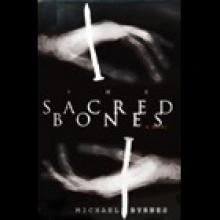 The Sacred Bones
The Sacred Bones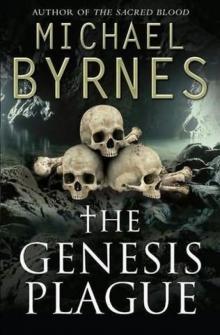 The Genesis Plague (2010)
The Genesis Plague (2010)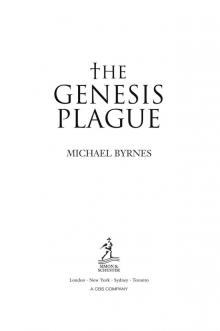 The Genesis Plague
The Genesis Plague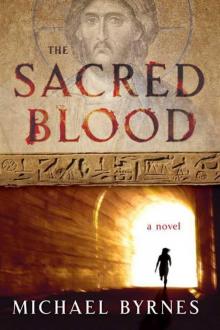 The Sacred Blood
The Sacred Blood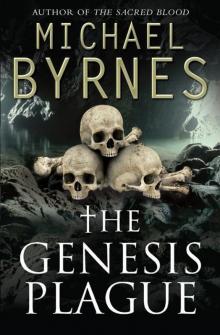 The Genesis Plague tf-1
The Genesis Plague tf-1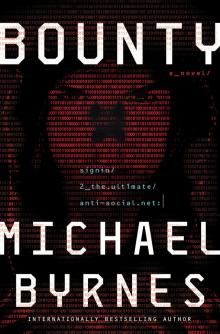 Bounty
Bounty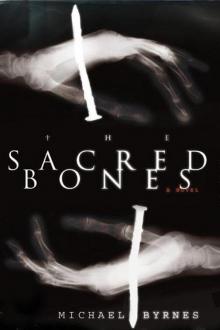 Sacred Bones : A Novel
Sacred Bones : A Novel